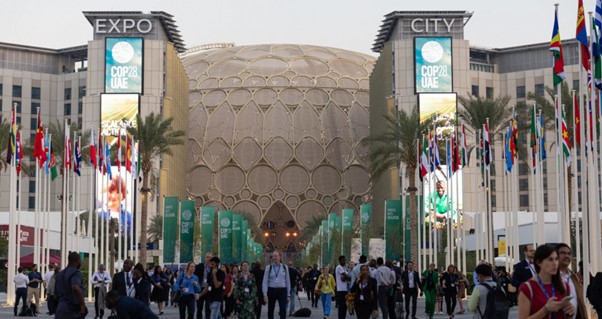
BY AZNIE RAHIM
Climate change is probably the buzzword every time the Conference of Parties (COP) is organised. Recently, I had the privilege of attending COP28 in Dubai, an experience that not only unveiled the complexities of climate negotiations but also highlighted the pivotal role of water in our adaptive strategies.
Fraught Journey from Muscat
My journey started from Muscat, a serene contrast to the bustling energy of Dubai. The journey to Dubai was an adventure, having to take a more a challenging route of 8-hour land transport, with no proper toilet break nor breakfast through the Hatta border. The immigration and customs clearance alone took 2 hours, what feels like an eternity for a hungry and sleep-deprived traveller. Perhaps I’ve been coddled for too long that taking the bus with the average migrant feels very taxing to me. This segment of the society relies on public transport. I cannot imagine what it feels like making the journey during peak summer when the temperature soars to 55 degrees celsius. No amount of water would be enough for that kind of heat.
The harsh climate made me grateful that simple modern amenities like air-conditioning and running water, often taken for granted, bear unparalleled importance in sustaining life amidst harsh climates. The realisation that water is probably the only thing that determines survival and the start of civilisation in this region, humbled this average Malaysian whose daily bathing ritual has very little regard for what water scarcity truly means for regions like this. Appreciating the importance of water’s precious role in adaptation, I truly believe that climate change’s impact on water is of great importance for discussions.
Water for Climate Diplomacy
The Paris Agreement acknowledges the critical role of adaptation in mitigating the adverse effects of global warming, with water at its core due to its pervasive impact on various sectors and ecosystems. Addressing water-related challenges—such as scarcity, quality, and extreme weather events—is pivotal in fulfilling the Agreement’s objectives, ensuring resilience in a warming world. Incorporating water within the adaptation framework not only aligns with the Paris Agreement’s intent but also amplifies its effectiveness by embracing a holistic approach to climate resilience. If reducing CO2 is for mitigation, then H2O is for adaptation.
I believe that Water plays a key role in climate diplomacy in Malaysia, as the impact of climate change mostly involves adaptation to flood, drought, and sea level rise. This would translate into sectoral planning for water management, food security, public health, and urban resilience, among others. Ultimately, sectoral planning requires a deep understanding of how much climate change has impacted our water cycle. The development of the Global Goal on Adaptation framework and announcement of the new Loss and Damage Funding mechanism would involve water being immersed in climate implementation and the discourse of the irreversible impact of climate change, a discussion yet to be explored in Malaysia.
When I moved to water resources from the climate division, the climate negotiation delegate had yet to include the water policy. Most of the conversation for water involved technical discussions or meetings at the implementation level. I am happy that our water policy is playing a bigger role in the delegation for COP28.
Our presence during the UN 2023 Water Conference in March 2023 felt like the start of water diplomacy. Malaysia submitted 2 voluntary commitments for the Water Action Agenda: flood management and climate change adaptation, and the Water Sector Transformation. The national statement sets the motion for more constructive dialogues on transformative initiatives like the water footprint during the International Greentech & Eco Products Exhibition & Conference Malaysia (IGEM) in October 2023.
For COP28, we explored the Water Food Energy Nexus with the hope that water’s role is highlighted in building resilience against the impact of climate change and the just transition agenda. I believe that by moving into strategic themes, would not only build water’s capacity but stamp its role at multilateral platforms. Shifting the business-as-usual policy-making of talking about water management, previously siloed between water resources, supply and sanitation, is transformative and adaptive for Malaysia.
Beyond COP28: One Drop at a Time
I have high hopes that a shift towards implementing substantive initiatives will be pursued after COP28. For Water, the transformation exercise is crucial to make sure that the water-climate nexus leads to the mainstreaming of adaptation at the sectoral level. Adaptation needs water’s direct involvement in the negotiation process and its implementation.
As we traverse this dynamic landscape of global diplomacy, let us continue championing initiatives that echo the sentiment—water is not just an essential resource, but the cornerstone of our adaptive resilience in a changing world. Let us drive this transformative journey—one drop at a time.
Note: The author is the Country Chair for Climate Action and Environment (G100 Club).

















